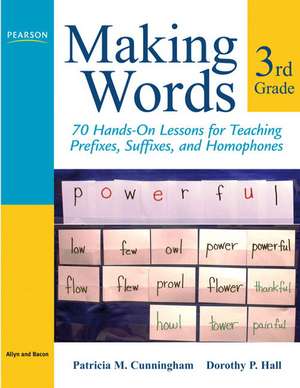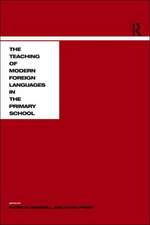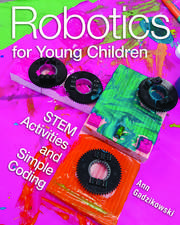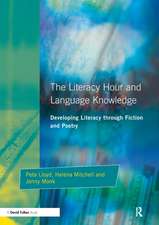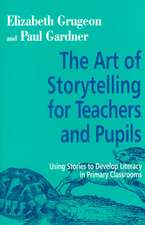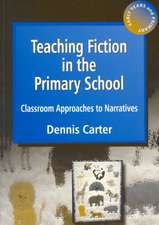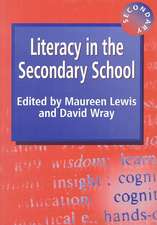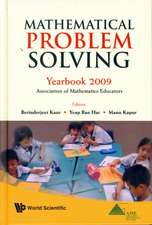Making Words Third Grade: 70 Hands-On Lessons for Teaching Prefixes, Suffixes, and Homophones: Making Words
Autor Patricia M. Cunningham, Dorothy P. Hallen Limba Engleză Paperback – 30 noi 2007 – vârsta de la 18 până la 18 ani
- Features 70 fun andinteractive lessons for building rhyming and decoding skills.
- Presents a concise method for involving students in the process of identifying homophones, prefixes, and suffixes and how these change the meanings of words in sentences.
- Promotes student awareness of similarities in words that helpsdevelop writing skills.
- Includes reproducible letter tiles, record sheets for each lesson, and take-home sheetsto copy, cut, and/or laminate.
- Highlights a list of useful children's books toextend the Making Words lesson.
Preț: 398.54 lei
Nou
Puncte Express: 598
Preț estimativ în valută:
76.26€ • 79.79$ • 63.35£
76.26€ • 79.79$ • 63.35£
Carte disponibilă
Livrare economică 13-27 martie
Preluare comenzi: 021 569.72.76
Specificații
ISBN-13: 9780205580934
ISBN-10: 0205580939
Pagini: 80
Dimensiuni: 215 x 274 x 7 mm
Greutate: 0.29 kg
Ediția:1
Editura: Allyn & Bacon
Seria Making Words
Locul publicării:Boston, United States
ISBN-10: 0205580939
Pagini: 80
Dimensiuni: 215 x 274 x 7 mm
Greutate: 0.29 kg
Ediția:1
Editura: Allyn & Bacon
Seria Making Words
Locul publicării:Boston, United States
Descriere
An active and innovative approach to making words that teachers and their students have grown to love is finally here!
Based on its highly successful parent text, Phonics They Use, this new grade-level series Making Words offers teachers a fresh multi-level activity and lesson series written for the kindergarten through fifth grade classroom. Pat Cunningham and Dottie Hall present classroom teachers with effective tools for strengthening phonics and spelling skills that encourage students to move beyond learning and into a world of word discovery. Each research-based volume includes a wealth of friendly, hands-on, manipulative activities that guide teachers in teaching the development of words--from phonemic awareness to spelling.
In Making Words Third Grade, Pat and Dottie introduce third grade teachers to 70 lessons that teach the homophones, spelling changes, prefixes and suffixes that most third grade curriculums cover. Each Making Words activity contains rhyming words which help children review the more complex vowel patterns. Including homophones, prefixes, suffixes, spelling changes, and complex rhyming patterns allowing third graders at all levels to make progress in their spelling and decoding ability.
Making Words Third Grade is the best resource you can have on hand for motivating your students to learn words!
Based on its highly successful parent text, Phonics They Use, this new grade-level series Making Words offers teachers a fresh multi-level activity and lesson series written for the kindergarten through fifth grade classroom. Pat Cunningham and Dottie Hall present classroom teachers with effective tools for strengthening phonics and spelling skills that encourage students to move beyond learning and into a world of word discovery. Each research-based volume includes a wealth of friendly, hands-on, manipulative activities that guide teachers in teaching the development of words--from phonemic awareness to spelling.
In Making Words Third Grade, Pat and Dottie introduce third grade teachers to 70 lessons that teach the homophones, spelling changes, prefixes and suffixes that most third grade curriculums cover. Each Making Words activity contains rhyming words which help children review the more complex vowel patterns. Including homophones, prefixes, suffixes, spelling changes, and complex rhyming patterns allowing third graders at all levels to make progress in their spelling and decoding ability.
Making Words Third Grade is the best resource you can have on hand for motivating your students to learn words!
- Features 70 fun and interactive lessons for building rhyming and decoding skills.
- Presents a concise method for involving students in the process of identifying homophones, prefixes, and suffixes and how these change the meanings of words in sentences.
- Promotes student awareness of similarities in words that helps develop writing skills.
- Includes reproducible letter tiles, record sheets for each lesson, and take-home sheets to copy, cut, and/or laminate.
- Highlights a list of useful children's books to extend the Making Words lesson.
Cuprins
Introduction
Lesson 1 shopping
Lesson focus: spelling change: double the p when adding ing
Lesson 2 tripped
Lesson focus: spelling change: double the p when adding ed
homophones tied, tide
Lesson 3 scrubbing
Lesson focus spelling change: double the b when adding ing
Lesson 4 branches
Lesson focus: spelling change: es is added when words end in ch
Lesson 5 crashes
Lesson focus: spelling change: es is added when words end in sh orch
Lesson 6 shoppers
Lesson focus: suffix er meaning person or thing that does something
spelling change: double the p when adding er
Lesson 7 gardeners
Lesson focus: suffix er meaning person or thing that does something
spelling change: drop final e when adding er
homophones: dear, deer
Lesson 8 planners
Lesson focus: suffix er meaning person or thing that does something
spelling change: double the n when adding er
Lesson 9 beginners
Lesson focus: suffix er meaning person or thing that does something
spelling change: double the n when adding er
homophones: be, bee; in, inn
Lesson 10 collectors
Lesson focus: suffix or meaning person or thing that does something
suffixes er, est meaning more and most
homophones: cell, sell; role roll
Lesson 11 instructor
Lesson focus: suffix or meaning person or thing that does something
suffix ist meaning person or thing that does something
homophones: sun, son
Lesson 12 directors
Lesson focus: suffix or meaning person or thing that does something
Lesson 13 maddest
Lesson focus: suffix est meaning most
spelling change: double the d when adding est
homophones: ad, add
Lesson 14 brightest
Lesson focus: suffixes er, est meaning more and most
suffix er, meaning person or thing that does something
spelling change: double the t when adding er
homophones: site, sight
Lesson 15 stronger
Lesson focus: suffix er meaning more
Lesson 16 disagreed
Lesson focus: suffix er meaning more
prefixdis meaning opposite
homophones: dear, deer
Lesson 17 discovery
Lesson focus: prefix dis
suffix er, meaning person or thing that does something
spelling change: change the y to i and add es ored
spelling change: drop the e when adding er
Lesson 18 security
Lesson focus: suffix y
spelling change: change the y to i and add es
Lesson 19 funniest
Lesson focus: suffix est meaning most
spelling change: change y to i when adding est
prefixun meaning opposite
Lesson 20 unhappier
Lesson focus: prefix un meaning not
suffix er meaning more
suffix en
spelling change: change the y to i when adding er
spelling change: drop thee when addingen
homophones: pear, pair; pane, pain; rein, rain
Lesson 21 forgotten
Lesson focus: suffix en
spelling change: double the t when adding en
homophones: to, too
Lesson 22 clothes
Lesson focus: homophones: close, clothes
Lesson 23 everything
Lesson focus: suffix er, meaning person or thing that does something
suffix en
spelling change: drop thee when addinger oren
homophones: their, there
Lesson 24 airplanes
Lesson focus: homophones: pail, pale; sail, sale; pain, pane; rain, rein;
pair, pear; plane, plane
Lesson 25 breakfast
Lesson focus: suffix er, meaning person or thing that does something
suffix er, meaning more
spelling change: drop thee when addinger
homophones: bare, bear; break, brake; stake, steak
Lesson 26 couldn’t
Lesson focus: prefixun meaning opposite
contractions: don’t, couldn’t
Lesson 27 shouldn’t
Lesson focus: prefixun meaning opposite
contractions don’t, shouldn’t
homophones: sun, son
Lesson 28 wouldn’t
Lesson focus: prefixun meaning opposite
contractions: won’t, wouldn’t
Lesson 29 countdown
Lesson focus: homophones: to, two, too; wood, would
Lesson 30 powerful
Lesson focus: suffix ful
homophones: for, four; flour, flower
Lesson 31 wonderful
Lesson focus: suffix ful
suffix er, meaning person or thing that does something
prefixun meaning opposite
homophones: won, one; flour, flower
Lesson 32 carefully
Lesson focus: suffixes ful, ly, y
prefixre meaning back
Lesson 33 thankless
Lesson focus: suffixes en, less
spelling change: drop final e when adding en
Lesson 34 carelessly
Lesson focus: suffixes less, ly, y
prefix re meaning back
spelling change: drop final e when adding y
Lesson 35 paperweight
Lesson focus: homophones: ate, eight; rap, wrap; right, write; wait, weight
Lesson 36 vacations
Lesson focus: suffix tion
Lesson 37 connections
Lesson focus: suffixes tion, est
homophones: sent, cent, scent
Lesson 38 expression
Lesson focus: suffixes sion, en, er, ness
prefixre meaning again
spelling change: es is added when words end in x
Lesson 39 returning
Lesson focus suffix er meaning person or thing that does something
spelling change: double the n when adding er
prefixre meaning back or again
prefixun meaning opposite
Lesson 40 rewriting
Lesson focus prefix re meaning again
suffix er, meaning person or thing that does something
spelling change: drop the e when adding er or ing
Lesson 41 knowledge
Lesson focus: suffixen
homophones no, know; new, knew
Lesson 42 blueberry
Lesson focus: suffix er meaning person or thing that does something
suffix y
spelling change: drop final e when adding er
homophones:by, buy; bury, berry
Lesson 43 creatures
Lesson focus: suffixes ure, er
spelling change: drop final e when adding er, ure
Lesson 44 departure
Lesson focus: suffixes ure, er
spelling change: drop final e when adding er, ure
prefixre meaning again
homophones: deer, dear
Lesson 45 pleasure
Lesson focus: suffix ure
spelling change: drop final e when adding ure
prefixre meaning back
Lesson 46 acceptable
Lesson focus: suffix able
homophones: be, bee; beet, beat
Lesson 47 exceptions
Lesson focus: suffix tion
homophones: except, accept (from previous lesson)
Lesson 48 whatever
Lesson focus: suffix er meaning person or thing that does something
prefixre meaning back
homophones: hear, here
Lesson 49 whether
Lesson focus: homophones: we, wee; whether, weather
Lesson 50 throughout
Lesson focus: homophones: our, hour; through, threw
Lesson 51 mailboxes
Lesson focus: spelling change: es is added when words end in x
homophones: mail, male; sail, sale
Lesson 52 government
Lesson focus: suffixes er, ment
spelling change: drop final e when adding er
prefixre meaning back
Lesson 53 measurement
Lesson focus: suffixes ment, est
prefixre meaning again
homophones: meat, meet
Lesson 54 dangerous
Lesson focus: suffix ous
Homophones: rode, road
Lesson 55 mountainous
Lesson focus: suffix ous
Lesson 56 personal
Lesson focus: suffix al
homophones: sore, soar
Lesson 57 electrical
Lesson focus: suffix er meaning more
suffix al
prefix re meaning back or again
spelling change: drop final e when adding er
Lesson 58 sensible
Lesson focus: suffixes en, ible
homophones: be, bee
Lesson 59 impossible
Lesson focus: prefixim meaning opposite
Lesson 60 incomplete
Lesson focus: suffix tion
prefixin meaning opposite
Lesson 61 weakness
Lesson focus: suffixes ness, en
spelling change: drop final e when adding en
homophones: see, sea; new, knew; weak, week
Lesson 62 unhappiness
Lesson focus: suffix ness
spelling change: es is added when words end in sh
spelling change: change the y to i and add ness
prefixun meaning opposite
Lesson 63 unworkable
Lesson focus: suffixes: en, able
spelling change: drop final e when adding en
prefixun meaning opposite
homophones: no, know; new, knew
Lesson 64 appreciate
Lesson focus: homophones piece, peace
Lesson 65 wheelbarrows
Lesson focus: prefixre meaning again
homophones: : war, wore; sore, soar; wear, where; hole, whole
Lesson 66 dishwasher
Lesson focus: spelling change: es is added when words end in sh
homophones herd, heard
Lesson 67 vegetables
Lesson focus: homophones: be, bee; see, sea; beats, beets
Lesson 68 rollerblade
Lesson focus: homophones:role, roll; road, rode; board, bored
Lesson 69 horseback
Lesson focus: suffix er meaning person or thing that does something
spelling change: drop final e when adding er
homophones break, brake
Lesson 70 birdhouses
Lesson focus: spelling change: es is added when words end in sh
homophones our, hour
Reproducible Letter Strips
Reproducible Take Home Sheet
Reproducible Homophone Book
Lesson 1 shopping
Lesson focus: spelling change: double the p when adding ing
Lesson 2 tripped
Lesson focus: spelling change: double the p when adding ed
homophones tied, tide
Lesson 3 scrubbing
Lesson focus spelling change: double the b when adding ing
Lesson 4 branches
Lesson focus: spelling change: es is added when words end in ch
Lesson 5 crashes
Lesson focus: spelling change: es is added when words end in sh orch
Lesson 6 shoppers
Lesson focus: suffix er meaning person or thing that does something
spelling change: double the p when adding er
Lesson 7 gardeners
Lesson focus: suffix er meaning person or thing that does something
spelling change: drop final e when adding er
homophones: dear, deer
Lesson 8 planners
Lesson focus: suffix er meaning person or thing that does something
spelling change: double the n when adding er
Lesson 9 beginners
Lesson focus: suffix er meaning person or thing that does something
spelling change: double the n when adding er
homophones: be, bee; in, inn
Lesson 10 collectors
Lesson focus: suffix or meaning person or thing that does something
suffixes er, est meaning more and most
homophones: cell, sell; role roll
Lesson 11 instructor
Lesson focus: suffix or meaning person or thing that does something
suffix ist meaning person or thing that does something
homophones: sun, son
Lesson 12 directors
Lesson focus: suffix or meaning person or thing that does something
Lesson 13 maddest
Lesson focus: suffix est meaning most
spelling change: double the d when adding est
homophones: ad, add
Lesson 14 brightest
Lesson focus: suffixes er, est meaning more and most
suffix er, meaning person or thing that does something
spelling change: double the t when adding er
homophones: site, sight
Lesson 15 stronger
Lesson focus: suffix er meaning more
Lesson 16 disagreed
Lesson focus: suffix er meaning more
prefixdis meaning opposite
homophones: dear, deer
Lesson 17 discovery
Lesson focus: prefix dis
suffix er, meaning person or thing that does something
spelling change: change the y to i and add es ored
spelling change: drop the e when adding er
Lesson 18 security
Lesson focus: suffix y
spelling change: change the y to i and add es
Lesson 19 funniest
Lesson focus: suffix est meaning most
spelling change: change y to i when adding est
prefixun meaning opposite
Lesson 20 unhappier
Lesson focus: prefix un meaning not
suffix er meaning more
suffix en
spelling change: change the y to i when adding er
spelling change: drop thee when addingen
homophones: pear, pair; pane, pain; rein, rain
Lesson 21 forgotten
Lesson focus: suffix en
spelling change: double the t when adding en
homophones: to, too
Lesson 22 clothes
Lesson focus: homophones: close, clothes
Lesson 23 everything
Lesson focus: suffix er, meaning person or thing that does something
suffix en
spelling change: drop thee when addinger oren
homophones: their, there
Lesson 24 airplanes
Lesson focus: homophones: pail, pale; sail, sale; pain, pane; rain, rein;
pair, pear; plane, plane
Lesson 25 breakfast
Lesson focus: suffix er, meaning person or thing that does something
suffix er, meaning more
spelling change: drop thee when addinger
homophones: bare, bear; break, brake; stake, steak
Lesson 26 couldn’t
Lesson focus: prefixun meaning opposite
contractions: don’t, couldn’t
Lesson 27 shouldn’t
Lesson focus: prefixun meaning opposite
contractions don’t, shouldn’t
homophones: sun, son
Lesson 28 wouldn’t
Lesson focus: prefixun meaning opposite
contractions: won’t, wouldn’t
Lesson 29 countdown
Lesson focus: homophones: to, two, too; wood, would
Lesson 30 powerful
Lesson focus: suffix ful
homophones: for, four; flour, flower
Lesson 31 wonderful
Lesson focus: suffix ful
suffix er, meaning person or thing that does something
prefixun meaning opposite
homophones: won, one; flour, flower
Lesson 32 carefully
Lesson focus: suffixes ful, ly, y
prefixre meaning back
Lesson 33 thankless
Lesson focus: suffixes en, less
spelling change: drop final e when adding en
Lesson 34 carelessly
Lesson focus: suffixes less, ly, y
prefix re meaning back
spelling change: drop final e when adding y
Lesson 35 paperweight
Lesson focus: homophones: ate, eight; rap, wrap; right, write; wait, weight
Lesson 36 vacations
Lesson focus: suffix tion
Lesson 37 connections
Lesson focus: suffixes tion, est
homophones: sent, cent, scent
Lesson 38 expression
Lesson focus: suffixes sion, en, er, ness
prefixre meaning again
spelling change: es is added when words end in x
Lesson 39 returning
Lesson focus suffix er meaning person or thing that does something
spelling change: double the n when adding er
prefixre meaning back or again
prefixun meaning opposite
Lesson 40 rewriting
Lesson focus prefix re meaning again
suffix er, meaning person or thing that does something
spelling change: drop the e when adding er or ing
Lesson 41 knowledge
Lesson focus: suffixen
homophones no, know; new, knew
Lesson 42 blueberry
Lesson focus: suffix er meaning person or thing that does something
suffix y
spelling change: drop final e when adding er
homophones:by, buy; bury, berry
Lesson 43 creatures
Lesson focus: suffixes ure, er
spelling change: drop final e when adding er, ure
Lesson 44 departure
Lesson focus: suffixes ure, er
spelling change: drop final e when adding er, ure
prefixre meaning again
homophones: deer, dear
Lesson 45 pleasure
Lesson focus: suffix ure
spelling change: drop final e when adding ure
prefixre meaning back
Lesson 46 acceptable
Lesson focus: suffix able
homophones: be, bee; beet, beat
Lesson 47 exceptions
Lesson focus: suffix tion
homophones: except, accept (from previous lesson)
Lesson 48 whatever
Lesson focus: suffix er meaning person or thing that does something
prefixre meaning back
homophones: hear, here
Lesson 49 whether
Lesson focus: homophones: we, wee; whether, weather
Lesson 50 throughout
Lesson focus: homophones: our, hour; through, threw
Lesson 51 mailboxes
Lesson focus: spelling change: es is added when words end in x
homophones: mail, male; sail, sale
Lesson 52 government
Lesson focus: suffixes er, ment
spelling change: drop final e when adding er
prefixre meaning back
Lesson 53 measurement
Lesson focus: suffixes ment, est
prefixre meaning again
homophones: meat, meet
Lesson 54 dangerous
Lesson focus: suffix ous
Homophones: rode, road
Lesson 55 mountainous
Lesson focus: suffix ous
Lesson 56 personal
Lesson focus: suffix al
homophones: sore, soar
Lesson 57 electrical
Lesson focus: suffix er meaning more
suffix al
prefix re meaning back or again
spelling change: drop final e when adding er
Lesson 58 sensible
Lesson focus: suffixes en, ible
homophones: be, bee
Lesson 59 impossible
Lesson focus: prefixim meaning opposite
Lesson 60 incomplete
Lesson focus: suffix tion
prefixin meaning opposite
Lesson 61 weakness
Lesson focus: suffixes ness, en
spelling change: drop final e when adding en
homophones: see, sea; new, knew; weak, week
Lesson 62 unhappiness
Lesson focus: suffix ness
spelling change: es is added when words end in sh
spelling change: change the y to i and add ness
prefixun meaning opposite
Lesson 63 unworkable
Lesson focus: suffixes: en, able
spelling change: drop final e when adding en
prefixun meaning opposite
homophones: no, know; new, knew
Lesson 64 appreciate
Lesson focus: homophones piece, peace
Lesson 65 wheelbarrows
Lesson focus: prefixre meaning again
homophones: : war, wore; sore, soar; wear, where; hole, whole
Lesson 66 dishwasher
Lesson focus: spelling change: es is added when words end in sh
homophones herd, heard
Lesson 67 vegetables
Lesson focus: homophones: be, bee; see, sea; beats, beets
Lesson 68 rollerblade
Lesson focus: homophones:role, roll; road, rode; board, bored
Lesson 69 horseback
Lesson focus: suffix er meaning person or thing that does something
spelling change: drop final e when adding er
homophones break, brake
Lesson 70 birdhouses
Lesson focus: spelling change: es is added when words end in sh
homophones our, hour
Reproducible Letter Strips
Reproducible Take Home Sheet
Reproducible Homophone Book
Notă biografică
Patricia M. Cunningham is a Professor of Education at Wake Forest University. She has over 30 years of experience, taught in various elementary grades and remedial reading, and was a curriculum coordinator and director of reading. Her major professional goal is promoting literacy for all children and currently engages in Four-Blocks® workshops and staff development with educators.
Dorothy P. Hall is a Professor of Education at Wake Forest University.
Dorothy P. Hall is a Professor of Education at Wake Forest University.
Textul de pe ultima copertă
Patricia M. Cunningham Dorothy P. Hall
Making Words 3rd Grade
70 Hands-On Lessons for Teaching Prefixes, Suffixes, and Homophones
Based on the best selling book, Phonics They Use: Words for Reading and Writing, this grade level series offers a fresh pairing of lessons and activities for kindergarten through fifth grade. In Making Words: Third Grade, Pat and Dottie provide third grade teachers with 70 Making Words lessons that cover all of the spelling and decoding skills included in most third grade curricula. After making words in the first part of the lesson, students sort these words for homophones, prefixes, suffixes, spelling changes, and complex rhyming patterns–allowing third graders at all levels to make progress in their spelling and decoding ability.
“[Pat] covers the gamut of instruction [and] the examples are great. I already find myself planning lessons for the coming year!”
–Amy Martindale Kelly, third grade teacher, Gratham School, Goldsboro, NC
“[A] great resource…the students will benefit greatly from seeing how words are put together. I plan to include lessons of this type in the years to come!”
–Sonya Patrick, third grade teacher, Meadowlark Elementary School, Winston Salem, NC
“[Pat and Dottie] did a wonderful job of putting these [lessons] together. As a teacher, I was really impressed with the content of this book.”
–Toni Harbaugh, third grade teacher, Horizon Elementary School, Jerome, ID
Patricia M. Cunningham is the author of Beyond Retelling, Classrooms That Work, Schools That Work, and Phonics They Use, all published by Allyn & Bacon, as well as a professor of education at Wake Forest University. She has over 30 years of experience in various elementary grades and with remedial reading and has served as a curriculum coordinator and director of reading. Pat promotes literacy for all children through her Four Blocks® workshops and staff development sessions with educators.
Dorothy P. Hall is the co-developer of the Four Blocks® framework and the director of the Four Blocks® Center at Wake Forest University. A former elementary teacher and education professor, she also presents workshops around the country on Four Blocks®, Building Blocks, guided reading strategies, and phonics instruction.
Caracteristici
- Features 70 fun and interactive lessons for building rhyming and decoding skills with your students.
- Presents a concise method for involving students in the process of identifying homophones, prefixes, and suffixes and how these change the meanings of words in sentences.
- Activates students’ prior knowledge and promotes learning of new words to perfect spelling skills.
- Includes reproducible letter strips, take-home sheet, and homophone book to help students remember what they learn.
- Provides teachers with step-by-step instructions, tips, and a wealth of examples for creating a personalized lesson from scratch.
